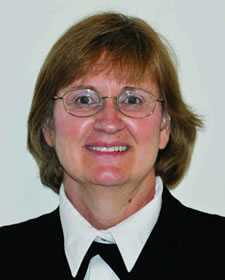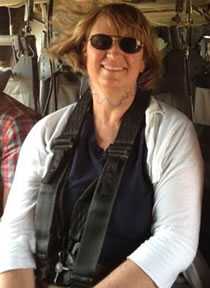CDC Women in STEM Careers - Gayle DeBord, PhD
Toxicologist
Captain, US Public Health Service
National Institute for Occupational Safety and Health, CDC

During her summer vacations, Gayle DeBord used to read five books a week. She especially enjoyed science fiction. They showed her worlds she had never imagined and inspired her to explore the possibilities.
That’s how she began her journey toward a career as a pharmacist and occupational safety and health researcher for a CDC department that helps prevent work-related injuries and illness. Science had expanded her horizons for a lifetime.
On her work in public health, she says, “My work at CDC gives me the chance to help make the world better.”
I started out as a research toxicologist and was recently appointed as Director of the National Institute for Occupational Safety and Health Center for Direct Reading and Sensor Technologies. One goal of the Center is to evaluate all the new gadgets to see how they can best be used in the practice for occupational safety and health.
Being a Smarty Pays Off for College

While working on Ebola in Liberia, Gayle traveled in a helicopter because of long distances and a lack of roads. Her team observed training given to Ebola burial teams.
In high school I liked biology and chemistry classes. But with both of my parents working factory jobs, I knew we didn’t have the money for me to go to college. Neither of my parents had gone to college. My goal was to earn good grades and get a college scholarship. I graduated at the top of my high school class, which greatly helped in getting financial aid to pay for my education.
Meanwhile, my high school chemistry teacher found a summer science program for me--students from all over the country were invited to spend eight weeks working on a research project at Indiana University. I was placed in a pharmacology laboratory to study drugs. It changed my life. I liked the work, I was good at it, and I wanted to learn more. So I decided to go to pharmacy school.
Back then the program included one year of pre-pharmacy courses and four years of additional college. During the summers I worked at a refrigerator plant and a peanut butter factory in my hometown. At school I worked in the toxicology laboratory researching how diseases work.
I was studying nuclear pharmacy and had applied for a program to work in Washington, D.C. The National Institute for Occupational Safety and Health (NIOSH), which is part of CDC, asked me to do research one summer. I stayed on after graduation. The work is rewarding because I support NIOSH’s mission of preventing work-related illnesses and injuries.
Cleaning up Real-Life Dramas
After the 2010 explosion of the Deepwater Horizon drilling rig in the Gulf of Mexico, many workers were bused in to help with the oil spill cleanup. I headed a team looking at the health hazards of beach workers in Florida, Alabama, and Mississippi. The workers spent 12 hours a day stooped over in hot sand, cleaning up the beach. We suggested ways to improve their posture and use better tools to prevent back problems.
"By researching and solving problems at work sites, we make a difference in people’s lives!"
Recently I deployed to West Africa to serve as the CDC Liberia Safety Officer. I was especially appreciative of the opportunity to help out on a global problem. While in Liberia, I observed training given to burial teams. When someone dies in Liberia a burial team is called. The burial team swabs the mouth of the deceased to be tested for Ebola. If the swab is positive for Ebola, then relatives and other contacts of the deceased are followed to see if they develop symptoms so treatment can be started as soon as possible. The hours were long but rewarding.
Advice to Girls and Young Women
- Be kind to everyone, because they may be your boss someday.
- Take care of the people who make your life easier, such as your assistant.
- Work hard, meet deadlines, and have the courage to step out of your comfort zone, because you never know what opportunities are waiting.
- Page last reviewed: September 24, 2015
- Page last updated: April 29, 2015
- Content source:


 ShareCompartir
ShareCompartir